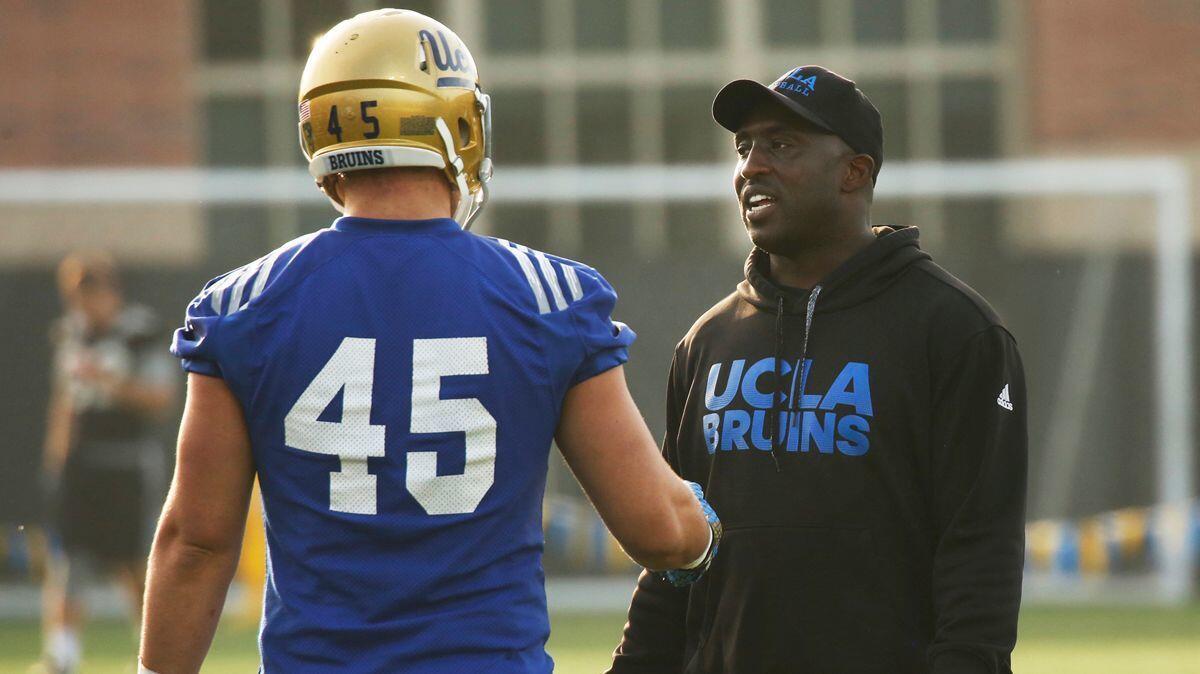DeShaun Foster begins tackling big problem: UCLA’s running game

- Share via
The late afternoon sun is casting increasingly long shadows across UCLA’s practice field as the running backs converge near one sideline to commence a drill. Each tailback and fullback alternates taking handoffs, securing the ball snug to his body before sprinting toward an imaginary line of scrimmage.
That’s where they are confronted by a contraption known as the Blaster, which features a series of horizontal foam rubber tentacles that simulate the contact they might absorb from a defensive tackle or a linebacker.
“I want to see your steps!” DeShaun Foster, the Bruins’ new running-backs coach, yells as tailback Brandon Stephens churns his legs while getting thwacked by the device. “Work your steps!”
Next, tailback Bolu Olorunfunmi takes a handoff and scurries ahead, his pace slowing after an initial burst of speed.
“Finish, Bolu!” Foster shouts. “Finish!”
No detail seems to elude Foster in his attempt to reignite a running game that flickered out completely last season. Bruins tailbacks never topped 100 yards in a game, Soso Jamabo’s 91-yard effort against Texas A&M in the opener standing as the individual season high. UCLA rarely reached 100 yards rushing as a team over the last half of the season, hitting that threshold only once in its final seven games.
The same school that had recently produced 1,000-yard rushing seasons from Paul Perkins and Johnathan Franklin barely nudged itself over that mark collectively in 2016, finishing with 1,011 yards and an average of only 2.93 yards per carry. UCLA’s 84.3 rushing yards per game ranked No. 127 among 128 major college teams.
The Bruins’ epic struggles surprised Foster, watching from afar as Texas Tech’s running-backs coach, but they also resulted in his return to his alma mater after the firing of offensive coordinator and running-backs coach Kennedy Polamalu.
“If I didn’t think they could do it, I don’t think I would have come back,” Foster said of the tailbacks with a laugh. “I don’t know if I can say that. But I have full confidence in these running backs.”
Foster knows exactly what he has to work with because he helped recruit Olorunfunmi, Jamabo and fellow tailback Nate Starks during his previous stint at UCLA as a graduate assistant and director of player development from 2013-15. The Bruins used five tailbacks last season, but Foster said the team would likely tighten its rotation as part of a new offense that will feature whichever players were having the most success.
Jamabo and Olorunfunmi have received the bulk of the first-team carries in spring practice. The Bruins have split freshman Jalen Starks’ repetitions between tailback and fullback, though Coach Jim Mora said he expected Starks to go back to playing tailback exclusively upon the arrival of a graduate transfer at fullback this summer.
Mora said he also anticipated adding two offensive linemen via graduate transfer to bolster a unit that was another major source of the team’s running woes last season. Foster’s assessment of what went wrong was lengthy.
“The point of attack might break down, one guy might miss a hole, miss a block, just little things here and there, nothing you can just put your thumb on and say, ‘We gotta fix that,’ ” Foster said. “It’s just stuff that we gotta get in there as a team and really apply the coaching and really get the guys to get in there and listen to what we’re saying and get out there and do it on the field.”
Foster’s coaching style could be considered inclusive because the running backs have input on the play calling based on which plays they like best. Foster said that was something his offensive coordinators did for him during his six seasons as a running back in the NFL, increasing his comfort level and productivity.
Olorunfunmi already said he felt more at ease playing for Foster, describing it as “like being home.”
“He’s kind of letting us play our own styles,” Olorunfunmi said, “like incorporate our styles with his coaching.”
Another philosophical shift is afoot under new offensive coordinator Jedd Fisch. While Polamalu had emphasized grinding out what he called ugly short yardage, Fisch said he was seeking more explosive running plays.
“There are always a lot of runs for two or three yards,” Fisch said, “but the ones that actually allow you to have the big rushing days are the ones where you can break one, that one 38-yard run, that one 50-yard run.”
The running backs have placed the onus on themselves as much as any of their coaches. Olorunfunmi said no one missed a day of winter workouts, eager to show they were better than their statistics would indicate.
Foster said the running backs just needed to get back to doing what UCLA had done with regularity in Mora’s first four seasons. They got off to a slow start this spring before making some significant strides in the last week.
Jalen Starks, his vast thighs and torso resembling those of a defensive lineman, rumbled for a touchdown toward the end of practice Monday. As he neared the end zone, his offensive teammates who had been watching from the sideline surged onto the field in delight.
Foster once scored some of his most memorable touchdowns in practice. His coach at Tustin High, Myron Miller, would line up 18 players on defense and give them the exact play the offense intended to run with Foster.
It didn’t matter. They never could stop him.
Foster likes his running backs to face similar challenges.
“I try to make practice the most uncomfortable situation for them,” Foster said, “so the game can be a celebration.”
Twitter: @latbbolch
More to Read
Go beyond the scoreboard
Get the latest on L.A.'s teams in the daily Sports Report newsletter.
You may occasionally receive promotional content from the Los Angeles Times.







